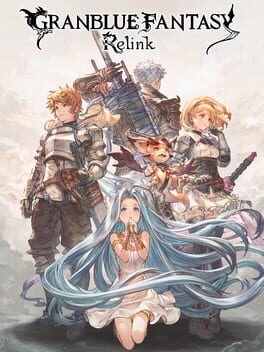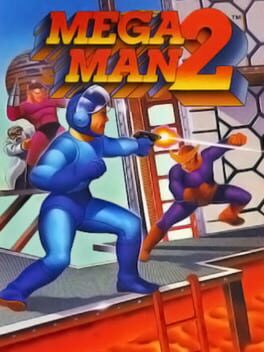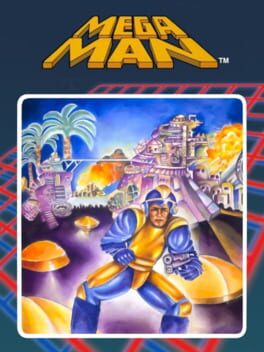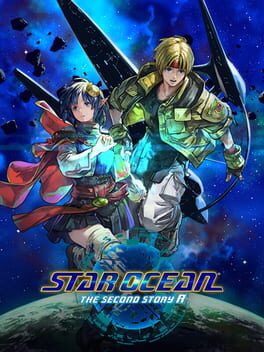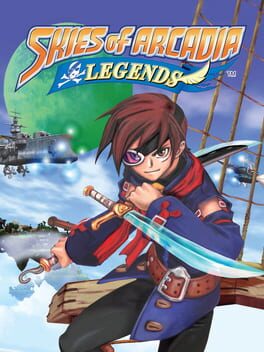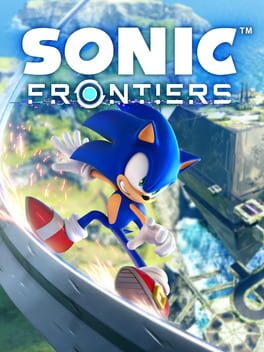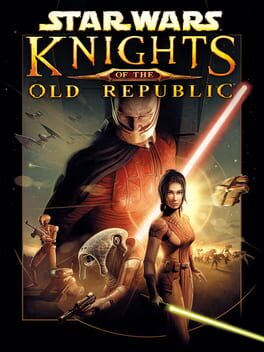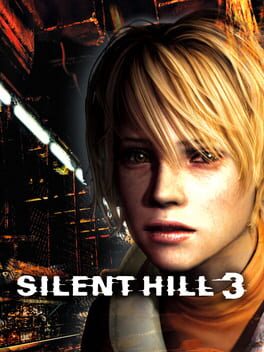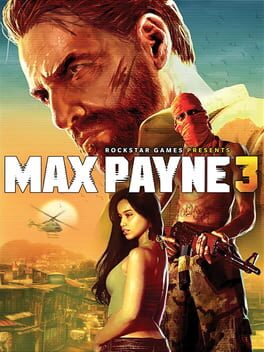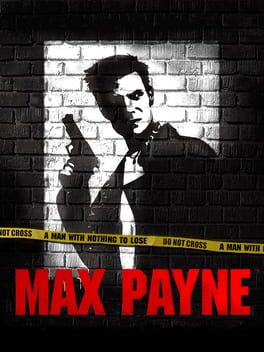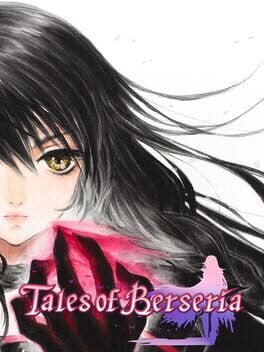ade
I've always been curious about Granblue Fantasy. Not enough to check out the long-running mobile game, mind you, but the art and general flavor of this series have piqued my interest for what feels like a decade now.
Did this game turn me into a Granblue Fantasy fan? Absolutely, but not in any way that I ever expected.
Maybe it was silly of me to think that this game would serve as a fresh, baggage-free introduction to this world and these characters. A cursory Google search could've told me otherwise. But somehow... none of that mattered to me in the long run. I adore this game, and I still don't know a thing about this world. Blistering combat, frenetic pacing, seamless multiplayer implementation, insane art direction, and an adventurous, swashbuckling tone (very reminiscent of one of my favorites, Skies of Arcadia) ensured that I was going to love this game no matter what.
Simply put, Cygames has put on an action RPG clinic here. Is this the first true successor to Kingdom Hearts 2?
Did this game turn me into a Granblue Fantasy fan? Absolutely, but not in any way that I ever expected.
Maybe it was silly of me to think that this game would serve as a fresh, baggage-free introduction to this world and these characters. A cursory Google search could've told me otherwise. But somehow... none of that mattered to me in the long run. I adore this game, and I still don't know a thing about this world. Blistering combat, frenetic pacing, seamless multiplayer implementation, insane art direction, and an adventurous, swashbuckling tone (very reminiscent of one of my favorites, Skies of Arcadia) ensured that I was going to love this game no matter what.
Simply put, Cygames has put on an action RPG clinic here. Is this the first true successor to Kingdom Hearts 2?
1989
In the year 200X, a super robot named Mega Man was created.
I replayed this in a single sitting tonight. It's not hard to see why Mega Man 2 is one of the most beloved titles on the NES. It takes the formula set out by the original game to dizzying new heights with its excellent level design and genuinely unforgettable music. Any chiptune musician worth their salt has cut their teeth on the Mega Man 2 sound font at some point. Despite the title, most fans would agree that this is the first true Mega Man game. Its extremely forgiving difficulty (other than the goddamn Boobeam Trap) is the only thing keeping it from all-time greatness.
I replayed this in a single sitting tonight. It's not hard to see why Mega Man 2 is one of the most beloved titles on the NES. It takes the formula set out by the original game to dizzying new heights with its excellent level design and genuinely unforgettable music. Any chiptune musician worth their salt has cut their teeth on the Mega Man 2 sound font at some point. Despite the title, most fans would agree that this is the first true Mega Man game. Its extremely forgiving difficulty (other than the goddamn Boobeam Trap) is the only thing keeping it from all-time greatness.
1987
Fight, Mega Man! For everlasting peace!
Here, Capcom sets the table for one of the most beloved franchises in gaming history. The ingredients are all here, but it's hard not to think of the original Mega Man as anything more than a first draft. This game is eye-wateringly difficult and filled with irritating game design (I KNOW you didn't grab the Magnet Beam on your first clear of Elec Man's stage). Even the music is pretty weak. I doubt there's a single Mega Man fan on Earth that thinks this is the best one, but it's an important game nonetheless.
Here, Capcom sets the table for one of the most beloved franchises in gaming history. The ingredients are all here, but it's hard not to think of the original Mega Man as anything more than a first draft. This game is eye-wateringly difficult and filled with irritating game design (I KNOW you didn't grab the Magnet Beam on your first clear of Elec Man's stage). Even the music is pretty weak. I doubt there's a single Mega Man fan on Earth that thinks this is the best one, but it's an important game nonetheless.
This is one of the best remakes of all time, without question. Whether we wanted it or not, we’re now firmly in the era where studios WILL put their hands all over our beloved childhood classics, and we’re in good hands if some of those are handled with anywhere near the level of respect that Gemdrops has shown for SO2 here. The Second Story R is a lovingly crafted return to a flawed, yet seminal PS1 classic - it updates in some much needed areas and preserves in others, but never once does it lose the original’s soulful, doujinesque flavor. If you’ve ever wanted to “get” Star Ocean, there’s no better game to play than this one. tri-Ace supremacy.
2023
Our flames are our own, and they burn as one.
Where to begin here… Well, I’ve been a Final Fantasy fan for most of my life. I used to stare into the Wal-Mart display case wishing we could afford a copy of FFVII. My brother and I rented FFVIII from Blockbuster, and we would restart our PS1 to watch the opening movie over and over—so much so that we had to buy our rented copy from Blockbuster. My dad wasn’t too happy with that. I’d watch in awe as my brother played FFX… I bought Dragon Quest VIII for the FFXII demo… anyway, you get it. It’s no secret that, with the exception of VII Remake, many think Final Fantasy has lost its way during the post-PS2 years. In my eyes, FFXVI would be the game to change that. A dream team of Square Enix veterans, a strong concept, a new platform… All of the cards were on the table, and I absolutely could not wait to play this. Does FFXVI live up to its namesake?
Well… if I had to describe this game in a single word, it would be “troubled.” It’s like someone at Square Enix tried to serve you the most delicious meal they’ve ever made, but your server dropped your food on the floor, slipped in it, and served it to you anyway. If you don’t stop and think about it too much, your food tastes really good—I mean, really good—but something is missing. I just wish it hadn’t been dropped in the first place. I would’ve really liked to eat my food without compromise. That’s what playing FFXVI is like. A series of half-measures more disparate than they should be. When they work in tandem to form a whole, the game is capable of some of the most awe-inspiring and emotionally resonant sequences this franchise has ever known. When they don’t, well…
Let’s get this out of the way right here: this was billed as FF’s first action title, but it’s neither an action game or an RPG. It’s somewhere in the middle and isn’t fully accomplished at capturing either genre. Combat feels extremely fluid and competently captures the spectacle that director Naoki Yoshida is known for. As for the RPG elements, there are “stats,” but you get the feeling that your level is more of a story progress bar than anything else. In fact, I left the game feeling like the only Eikon ability sets that aren’t phoned in are Titan and Odin. The Odin toolkit did a lot to win me back over, but Odin is also the only Eikon with abilities working in tandem—it feels like a classic Final Fantasy job change. There are numerous Eikon pairings that work well together and, I expect, numerous others that I hadn’t even considered. But again, it’s a half-measure. With only 6 equippable Eikon abilities at a time, a low variety of basic abilities, and the baffling absence of a buff/debuff/elemental weakness system, your options will be kind of limited regardless of how competent you are at Eikon synergy. You’d better enjoy doing the same things over, and over, and over if you’re going to get through this 70 hour juggernaut. Oh, and don’t expect anything from the game’s completely underbaked crafting system.
I’ve played games for 29 years, and FFXVI has the worst pacing I’ve ever encountered. Maybe that’s my fault, since I always try to 100% every game I commit to finishing, but no Final Fantasy game should punish the player for trying to see it to its fullest extent. This series is known the world over for its imaginative, thrilling storytelling, its striking characterizations, and its attention to detail. You’d never know that if FFXVI was your first Final Fantasy game. The game is constantly bookending its most powerful setpieces (which, in a vacuum, represent some of the highest highs in franchise history) with MMO quest design and low-energy NPC writing that, quite simply, don’t belong in this game. Like most of this thing, the concept here was a strong one—world-shaking battles between gods that leave smaller-scale everyday struggles in their wake. In practice, much of the game’s optional content brushes against its more skillfully executed components. You get the sense that Creative Business Unit III was just as bored by implementing these quests as we are playing them. I’m suspecting that the team wanted to make FFXVI a tightly executed 20 hours, but Square Enix’s top brass wouldn’t let them. “You can’t have a 20-hour mainline FF game!” This might be the only game in existence that had too much in the oven.
To put all of this another way, an old friend once recommended I read the Thomas Ligotti short story collection, Teatro Grottesco. It was terrifying, but not for the reasons you’d generally expect. Each of those stories felt like I was watching them unfold through a filthy glass window, like I could still see what was happening but there was a degree of separation preventing me from fully stepping inside Ligotti’s world. It’s the same case here. You might be thrilled by FFXVI’s spectacular Eikon battles or taken with its patient, meticulous portrayal of key players like Clive, Joshua, Jill, and Dion. Even with that in mind, I felt like I was outside of that dirty glass window at almost every turn. The game simply won’t let you inside unless you take every last one of its undeveloped elements as it is, never asking for more from one of the most storied franchises in gaming.
Who knows? Maybe I just need some distance from FFXVI. I enjoyed this plenty, but returning to it someday with a clearer picture of what it is might be to my benefit. For now, I’m happily locking this one up.
Where to begin here… Well, I’ve been a Final Fantasy fan for most of my life. I used to stare into the Wal-Mart display case wishing we could afford a copy of FFVII. My brother and I rented FFVIII from Blockbuster, and we would restart our PS1 to watch the opening movie over and over—so much so that we had to buy our rented copy from Blockbuster. My dad wasn’t too happy with that. I’d watch in awe as my brother played FFX… I bought Dragon Quest VIII for the FFXII demo… anyway, you get it. It’s no secret that, with the exception of VII Remake, many think Final Fantasy has lost its way during the post-PS2 years. In my eyes, FFXVI would be the game to change that. A dream team of Square Enix veterans, a strong concept, a new platform… All of the cards were on the table, and I absolutely could not wait to play this. Does FFXVI live up to its namesake?
Well… if I had to describe this game in a single word, it would be “troubled.” It’s like someone at Square Enix tried to serve you the most delicious meal they’ve ever made, but your server dropped your food on the floor, slipped in it, and served it to you anyway. If you don’t stop and think about it too much, your food tastes really good—I mean, really good—but something is missing. I just wish it hadn’t been dropped in the first place. I would’ve really liked to eat my food without compromise. That’s what playing FFXVI is like. A series of half-measures more disparate than they should be. When they work in tandem to form a whole, the game is capable of some of the most awe-inspiring and emotionally resonant sequences this franchise has ever known. When they don’t, well…
Let’s get this out of the way right here: this was billed as FF’s first action title, but it’s neither an action game or an RPG. It’s somewhere in the middle and isn’t fully accomplished at capturing either genre. Combat feels extremely fluid and competently captures the spectacle that director Naoki Yoshida is known for. As for the RPG elements, there are “stats,” but you get the feeling that your level is more of a story progress bar than anything else. In fact, I left the game feeling like the only Eikon ability sets that aren’t phoned in are Titan and Odin. The Odin toolkit did a lot to win me back over, but Odin is also the only Eikon with abilities working in tandem—it feels like a classic Final Fantasy job change. There are numerous Eikon pairings that work well together and, I expect, numerous others that I hadn’t even considered. But again, it’s a half-measure. With only 6 equippable Eikon abilities at a time, a low variety of basic abilities, and the baffling absence of a buff/debuff/elemental weakness system, your options will be kind of limited regardless of how competent you are at Eikon synergy. You’d better enjoy doing the same things over, and over, and over if you’re going to get through this 70 hour juggernaut. Oh, and don’t expect anything from the game’s completely underbaked crafting system.
I’ve played games for 29 years, and FFXVI has the worst pacing I’ve ever encountered. Maybe that’s my fault, since I always try to 100% every game I commit to finishing, but no Final Fantasy game should punish the player for trying to see it to its fullest extent. This series is known the world over for its imaginative, thrilling storytelling, its striking characterizations, and its attention to detail. You’d never know that if FFXVI was your first Final Fantasy game. The game is constantly bookending its most powerful setpieces (which, in a vacuum, represent some of the highest highs in franchise history) with MMO quest design and low-energy NPC writing that, quite simply, don’t belong in this game. Like most of this thing, the concept here was a strong one—world-shaking battles between gods that leave smaller-scale everyday struggles in their wake. In practice, much of the game’s optional content brushes against its more skillfully executed components. You get the sense that Creative Business Unit III was just as bored by implementing these quests as we are playing them. I’m suspecting that the team wanted to make FFXVI a tightly executed 20 hours, but Square Enix’s top brass wouldn’t let them. “You can’t have a 20-hour mainline FF game!” This might be the only game in existence that had too much in the oven.
To put all of this another way, an old friend once recommended I read the Thomas Ligotti short story collection, Teatro Grottesco. It was terrifying, but not for the reasons you’d generally expect. Each of those stories felt like I was watching them unfold through a filthy glass window, like I could still see what was happening but there was a degree of separation preventing me from fully stepping inside Ligotti’s world. It’s the same case here. You might be thrilled by FFXVI’s spectacular Eikon battles or taken with its patient, meticulous portrayal of key players like Clive, Joshua, Jill, and Dion. Even with that in mind, I felt like I was outside of that dirty glass window at almost every turn. The game simply won’t let you inside unless you take every last one of its undeveloped elements as it is, never asking for more from one of the most storied franchises in gaming.
Who knows? Maybe I just need some distance from FFXVI. I enjoyed this plenty, but returning to it someday with a clearer picture of what it is might be to my benefit. For now, I’m happily locking this one up.
With Marvel’s Spider-Man and Ratchet & Clank: Rift Apart, Insomniac started closing the book on who the best first-party Sony studio is. Those games were thrilling, interesting, tightly concepted, and most importantly, fun. They also used the toolset of their respective platforms to astounding effect and represented game design values Sony hasn’t focused on since the PS2 era—novelty, innovation, and vibrance. With Marvel’s Spider-Man 2, Insomniac hasn’t just closed the book. They’ve glued it shut.
Spider-Man is a character that represents so much to so many, myself included, and Insomniac never once loses sight of that. This is a game where American Sign Language and black history are rendered in equal detail to Peter and Miles’ lavish animations and an awe-inspiring recreation of New York City. Through every frame of this game, one easily gets the sense that Insomniac had just as much fun making this game as we do playing it. I’m still not sure how they did it, but Marvel’s Spider-Man 2 somehow has more impressive storytelling, pacing, quest design, combat flexibility, and environments than the latest Final Fantasy game. I wouldn’t have dreamed that a superhero game, of all things, would be a must-play title that sets a new standard for what can be achieved in this medium, but Insomniac managed to get there.
Combat is nimble, decently challenging, and evocative of the characters’ personalities without robbing the player of fine control. There are a truly dizzying amount of abilities and gadgets here—so much so that the game even includes a move list in the menu. The story takes Peter Parker and Miles Morales to new heights of emotional resonance. The world is jaw-dropping, and every single quest feels vital to aligning that world with Insomniac’s vision. The game is extremely exciting and paced masterfully, whether you’re playing it or just watching it all unfold. Simply put, this game cashes every single check it writes.
Now for the bad parts, of which there are surprisingly little. Except for the core cast, you can kind of sense that Insomniac designated their top artists to focus on the upcoming Wolverine game. I also thought the original game was slightly more varied in its sidequest types and stealth implementation. Even still, none of that matters in the face of what this game really achieves.
Throughout the 2000s, Marvel has routinely shown that they’re unsure of how to handle their most iconic character. Leave it to Insomniac to breathe new life into this once storied property. Marvel’s Spider-Man 2 is the very best adaptation of the Spider-Man universe we’ve ever gotten, and for my money, the very best PS5 exclusive game.
Spider-Man is a character that represents so much to so many, myself included, and Insomniac never once loses sight of that. This is a game where American Sign Language and black history are rendered in equal detail to Peter and Miles’ lavish animations and an awe-inspiring recreation of New York City. Through every frame of this game, one easily gets the sense that Insomniac had just as much fun making this game as we do playing it. I’m still not sure how they did it, but Marvel’s Spider-Man 2 somehow has more impressive storytelling, pacing, quest design, combat flexibility, and environments than the latest Final Fantasy game. I wouldn’t have dreamed that a superhero game, of all things, would be a must-play title that sets a new standard for what can be achieved in this medium, but Insomniac managed to get there.
Combat is nimble, decently challenging, and evocative of the characters’ personalities without robbing the player of fine control. There are a truly dizzying amount of abilities and gadgets here—so much so that the game even includes a move list in the menu. The story takes Peter Parker and Miles Morales to new heights of emotional resonance. The world is jaw-dropping, and every single quest feels vital to aligning that world with Insomniac’s vision. The game is extremely exciting and paced masterfully, whether you’re playing it or just watching it all unfold. Simply put, this game cashes every single check it writes.
Now for the bad parts, of which there are surprisingly little. Except for the core cast, you can kind of sense that Insomniac designated their top artists to focus on the upcoming Wolverine game. I also thought the original game was slightly more varied in its sidequest types and stealth implementation. Even still, none of that matters in the face of what this game really achieves.
Throughout the 2000s, Marvel has routinely shown that they’re unsure of how to handle their most iconic character. Leave it to Insomniac to breathe new life into this once storied property. Marvel’s Spider-Man 2 is the very best adaptation of the Spider-Man universe we’ve ever gotten, and for my money, the very best PS5 exclusive game.
"A young boy had a dream. A young girl has passion. A mysterious stranger had a mission. And the world will forever know their story. As long as there are dreamers who have the courage to pursue their dreams, the world will have heroes. And as long as there is a thirst to discover the unknown, there will be new stories to tell... and new adventures to be had."
Unlike many RPGs, Skies of Arcadia is not about obtaining best-in-slot gear or about doing 9999 damage or about mastering your party composition. In many cases, a player that isn't on the game's wavelength will be tearing their hair out at the game's random encounter rate, especially because combat is frequently unsurprising. Most of the time, you'll find yourself buffing Vyse as much as possible so that he can use Pirates' Wrath or Rain of Swords over and over and over and over. But, again, while serviceable and impressively textured, combat isn't the purpose of Skies of Arcadia. It is always trying to pull something much more childlike and optimistic out of the player—wonderment and anticipation of what strange civilization or discovery lies just beyond those far off clouds. This is one of the only turn-based RPGs I've played that understands the anticipatory pull of what's around the corner in the way that something like Wizardry does. Every discovery gives way to Arcadia's immense scope, with generations of lost history brewing just beneath the fold. The game is riddled with distinct problems that don't weigh against the experience of playing it, of unfurling it, or of finding peace in it. Skies of Arcadia feels like home.
Unlike many RPGs, Skies of Arcadia is not about obtaining best-in-slot gear or about doing 9999 damage or about mastering your party composition. In many cases, a player that isn't on the game's wavelength will be tearing their hair out at the game's random encounter rate, especially because combat is frequently unsurprising. Most of the time, you'll find yourself buffing Vyse as much as possible so that he can use Pirates' Wrath or Rain of Swords over and over and over and over. But, again, while serviceable and impressively textured, combat isn't the purpose of Skies of Arcadia. It is always trying to pull something much more childlike and optimistic out of the player—wonderment and anticipation of what strange civilization or discovery lies just beyond those far off clouds. This is one of the only turn-based RPGs I've played that understands the anticipatory pull of what's around the corner in the way that something like Wizardry does. Every discovery gives way to Arcadia's immense scope, with generations of lost history brewing just beneath the fold. The game is riddled with distinct problems that don't weigh against the experience of playing it, of unfurling it, or of finding peace in it. Skies of Arcadia feels like home.
2022
Let me open by saying that this is THE most subjective rating that I've ever given, as I don't think that this game will work for most people. In many cases, it won't even work for the most ardent Sonic the Hedgehog fan. Above all else, Sonic Frontiers is somewhat of a freak experiment - an amalgamation of different influences carried out with a vague level of uncertainty, but paired with a nearly apologetic degree of optimism.
As a former Sega Genesis kid, I've always found myself with this strange, inexplicable affinity for Sonic. I don't know why that is. I haven't enjoyed a Sonic game since Sonic Adventure 2, I don't care for a single one of Sonic's Genesis era titles, I detest both of the recent Sonic the Hedgehog movies, and I've never even dreamed of watching one of Sonic's numerous television adaptations. Still, I'm always rooting for Sonic, and I've long wished for an unmissable game that mirrors Sonic's legacy. Well, you've seen my relatively high rating for this. Is Sonic Frontiers that game? Well, no, but Sonic's future has never been brighter.
Let me get the obvious stuff out of the way: Sonic Frontiers is quite ugly, although it is far from visually uninspired. Sonic Frontiers is far too long, and its open world is couched much more in semi-meditative emptiness and infuriating navigation than in opportunity. Sonic Frontiers has about 10 different types of interlocking currency, and its map system and optional fast travel system will drive the average player insane. Sonic Frontiers has not one, not two, not three, but FOUR original boss themes by Kellin Quinn of Sleeping with Sirens. Sonic Frontiers has a maddeningly slow stat upgrade system that ultimately relies on fishing with Big the Cat to reasonably max out. Sonic Frontiers has unlockable side stories that tend to be much more trouble than they're worth. Sonic Frontiers has a barely functioning lock-on system and a skill tree that falls far below the expectations of a 2022 release. Sonic Frontiers is far. Too. Fucking. Long.
But you know what else? Through it all, Sonic Frontiers is FUN. Even with all of my criticisms in mind, I was still compelled to 100% this game. For the first time, Sonic Team has paid almost no mind to designing a satisfactory physics engine, electing instead to place that responsibility in the hands of the player. The wide, empty landscapes lend the player immense freedom to run unimpeded, and you're given the option to go under the hood and adjust Sonic's top speed, acceleration, brakes, steering, and camera distance. The level of trust placed in the player to create their ideal Sonic experience is like nothing I've ever seen from a game of this stature. When everything fits together—the dazzling spectacle tuned to Sonic's breakneck speed—the result is often nothing short of awe-inspiring. Not only that, but it remains abundantly clear that Sonic Team genuinely cared about the surprisingly dark narrative that they were trying to weave, even if I had some trouble following its implications.
Is this the Sonic game to end all Sonic games and silence Sonic's legions of naysayers? No, but I doubt that any game can wear that crown. However, Sonic Frontiers evinces something that has grown exceedingly rare in the AAA game space: the courage to upend one of gaming's most recognizable franchises. Here's your Sonic Adventure 3, with (almost) everything that that entails.
As a former Sega Genesis kid, I've always found myself with this strange, inexplicable affinity for Sonic. I don't know why that is. I haven't enjoyed a Sonic game since Sonic Adventure 2, I don't care for a single one of Sonic's Genesis era titles, I detest both of the recent Sonic the Hedgehog movies, and I've never even dreamed of watching one of Sonic's numerous television adaptations. Still, I'm always rooting for Sonic, and I've long wished for an unmissable game that mirrors Sonic's legacy. Well, you've seen my relatively high rating for this. Is Sonic Frontiers that game? Well, no, but Sonic's future has never been brighter.
Let me get the obvious stuff out of the way: Sonic Frontiers is quite ugly, although it is far from visually uninspired. Sonic Frontiers is far too long, and its open world is couched much more in semi-meditative emptiness and infuriating navigation than in opportunity. Sonic Frontiers has about 10 different types of interlocking currency, and its map system and optional fast travel system will drive the average player insane. Sonic Frontiers has not one, not two, not three, but FOUR original boss themes by Kellin Quinn of Sleeping with Sirens. Sonic Frontiers has a maddeningly slow stat upgrade system that ultimately relies on fishing with Big the Cat to reasonably max out. Sonic Frontiers has unlockable side stories that tend to be much more trouble than they're worth. Sonic Frontiers has a barely functioning lock-on system and a skill tree that falls far below the expectations of a 2022 release. Sonic Frontiers is far. Too. Fucking. Long.
But you know what else? Through it all, Sonic Frontiers is FUN. Even with all of my criticisms in mind, I was still compelled to 100% this game. For the first time, Sonic Team has paid almost no mind to designing a satisfactory physics engine, electing instead to place that responsibility in the hands of the player. The wide, empty landscapes lend the player immense freedom to run unimpeded, and you're given the option to go under the hood and adjust Sonic's top speed, acceleration, brakes, steering, and camera distance. The level of trust placed in the player to create their ideal Sonic experience is like nothing I've ever seen from a game of this stature. When everything fits together—the dazzling spectacle tuned to Sonic's breakneck speed—the result is often nothing short of awe-inspiring. Not only that, but it remains abundantly clear that Sonic Team genuinely cared about the surprisingly dark narrative that they were trying to weave, even if I had some trouble following its implications.
Is this the Sonic game to end all Sonic games and silence Sonic's legions of naysayers? No, but I doubt that any game can wear that crown. However, Sonic Frontiers evinces something that has grown exceedingly rare in the AAA game space: the courage to upend one of gaming's most recognizable franchises. Here's your Sonic Adventure 3, with (almost) everything that that entails.
This review contains spoilers
I am a lifelong Star Wars fan, and, like many other fans, I believe that the themes and storylines advanced by the Old Republic era are some of the most engrossing that the series has ever had. Every now and then, the “I should replay KotOR” bug hits me, and this time around, I decided to check out the iOS version.
There’s a lot to love here - memorable companions, extensive character progression, and an iconic storyline that has been burned into the minds of fans for almost 20 years. However, this type of game lives and dies by its writing, and this is where the original KotOR falls flat. Bioware doesn’t fully understand the dichotomy between the Jedi/Sith religions, as the writers elect to paint with noticeably broad strokes. In Bioware’s world, the Jedi as infallible heroes and their Sith counterparts are sinister, meritless psychopaths, other than in a couple of key instances. For example, in Bastila’s vaguely compelling, late-game turn to the dark side, she may as well be a different character entirely. I played as a Sith this time, and the game approaches this version of Revan as though he sacrifices children to unwind. This would later be remedied by Obsidian in KotOR 2, which heavily delves into the “grey area” and understands that a Jedi/Sith’s ideology should be shaped by their experiences. Its worth mentioning that Bioware’s broad approach significantly affected my immersion this time around.
Yes, the combat is simple, the planets are pretty rote, and the writing can leave a lot to be desired. With Aspyr’s KotOR remake on the horizon, a lot of people are going to have their eyes on this one, so let me quickly say: KotOR remains a must-play game in spite of its many flaws, and I’m confident that I’ll keep coming back to it anyway.
There’s a lot to love here - memorable companions, extensive character progression, and an iconic storyline that has been burned into the minds of fans for almost 20 years. However, this type of game lives and dies by its writing, and this is where the original KotOR falls flat. Bioware doesn’t fully understand the dichotomy between the Jedi/Sith religions, as the writers elect to paint with noticeably broad strokes. In Bioware’s world, the Jedi as infallible heroes and their Sith counterparts are sinister, meritless psychopaths, other than in a couple of key instances. For example, in Bastila’s vaguely compelling, late-game turn to the dark side, she may as well be a different character entirely. I played as a Sith this time, and the game approaches this version of Revan as though he sacrifices children to unwind. This would later be remedied by Obsidian in KotOR 2, which heavily delves into the “grey area” and understands that a Jedi/Sith’s ideology should be shaped by their experiences. Its worth mentioning that Bioware’s broad approach significantly affected my immersion this time around.
Yes, the combat is simple, the planets are pretty rote, and the writing can leave a lot to be desired. With Aspyr’s KotOR remake on the horizon, a lot of people are going to have their eyes on this one, so let me quickly say: KotOR remains a must-play game in spite of its many flaws, and I’m confident that I’ll keep coming back to it anyway.
2003
Silent Hill 3 is an audiovisual masterpiece that is just as beautiful as it is grotesque. More than any other Silent Hill installment, I think it's very difficult to play this game and not hope for Silent Hill to return in some form - this one feels the most like its aesthetic and thematic strengths could be taken to new heights today. One of the best survival horror games ever made.
2012
2001
2021
2016
This review contains spoilers
From its opening scene, Tales of Berseria carves out a unique identity within the Tales franchise. Ask almost anyone and they'll tell you that Berseria is the "dark one." Provided that you let go of your reservations, you'll feel intimately connected with the protagonist, Velvet, with relative ease--something that very few games manage to accomplish. Actually, Berseria has the best cast of any of the Tales games I've played so far (those being Symphonia, Abyss, Vesperia, and now this). Laphicet, in particular, is the most endearing "child character" in any JRPG I've played. So why didn't I love this game?
From the jump, Berseria introduces a lot of mechanics that lead almost nowhere. Combat is fast and frenetic. However, combat focuses on proccing stuns through elemental artes, as doing so will raise your soul gauge and allow you to extend your combo in turn. Because of that combat basis and Velvet's "Therionization" mechanic, the game is an absolute cakewalk, to the point that it becomes mind-numbingly boring by the second half. There is almost no incentive to experiment in combat, other than to flex, as you're always going to be working towards the same result--proccing stuns. On top of that, Velvet is unkillable when she's Therionized, and she will almost always be Therionized if you're halfway engaged in combat. The game has a random loot system in the vein of Diablo, ensuring that your character progression feels inconsequential. Finally, your reward for defeating powerful bosses--"code red" encounters and Class IV authorization zones--are incremental upgrades called ventites. I lost track of how many times I unlocked these items, and the item description was always along the lines of, "This ventite has a 40% chance to trigger a random skill when playing on Hard Mode." In the midst of all of this, you are asked to explore countless unimaginative and, frankly, unattractive environments, with the only real incentive for doing so coming from thousands of meaningless collectibles. From a gameplay perspective, Berseria piles unpleasant system after unpleasant system upon the player.
I've already praised Berseria's cast, but what about the story? The game manages several character moments that are both effective and well-earned: Shigure's last stand against Rokurou, Laphicet releasing Velvet from the Earthpulse, Eleanor's defection from the Abbey, and Arthur's death are moments that immediately come to mind. Unfortunately, Berseria's narrative often buckles over its own jargon. By the end of the game, your mind will be spinning with all sorts of in-universe terms--Malakhim, Daemons, Therions, Reaper's Curse, Scarlet Night, The Opening, The Advent, Empyreans, armatization, malevolence, Earthpulses, Innominat, blah blah blah blah. The game's incessant compulson to establish and discuss these concepts often clashes with what the game does right--Velvet's struggle against Artorius and her satisfying transformation from soulless, bloodthirsty Therion to brave, compassionate human.
Ultimately, Tales of Berseria is a decent game with numerous shortcomings. Still, I absolutely love these characters. I just wish I loved their game too.
From the jump, Berseria introduces a lot of mechanics that lead almost nowhere. Combat is fast and frenetic. However, combat focuses on proccing stuns through elemental artes, as doing so will raise your soul gauge and allow you to extend your combo in turn. Because of that combat basis and Velvet's "Therionization" mechanic, the game is an absolute cakewalk, to the point that it becomes mind-numbingly boring by the second half. There is almost no incentive to experiment in combat, other than to flex, as you're always going to be working towards the same result--proccing stuns. On top of that, Velvet is unkillable when she's Therionized, and she will almost always be Therionized if you're halfway engaged in combat. The game has a random loot system in the vein of Diablo, ensuring that your character progression feels inconsequential. Finally, your reward for defeating powerful bosses--"code red" encounters and Class IV authorization zones--are incremental upgrades called ventites. I lost track of how many times I unlocked these items, and the item description was always along the lines of, "This ventite has a 40% chance to trigger a random skill when playing on Hard Mode." In the midst of all of this, you are asked to explore countless unimaginative and, frankly, unattractive environments, with the only real incentive for doing so coming from thousands of meaningless collectibles. From a gameplay perspective, Berseria piles unpleasant system after unpleasant system upon the player.
I've already praised Berseria's cast, but what about the story? The game manages several character moments that are both effective and well-earned: Shigure's last stand against Rokurou, Laphicet releasing Velvet from the Earthpulse, Eleanor's defection from the Abbey, and Arthur's death are moments that immediately come to mind. Unfortunately, Berseria's narrative often buckles over its own jargon. By the end of the game, your mind will be spinning with all sorts of in-universe terms--Malakhim, Daemons, Therions, Reaper's Curse, Scarlet Night, The Opening, The Advent, Empyreans, armatization, malevolence, Earthpulses, Innominat, blah blah blah blah. The game's incessant compulson to establish and discuss these concepts often clashes with what the game does right--Velvet's struggle against Artorius and her satisfying transformation from soulless, bloodthirsty Therion to brave, compassionate human.
Ultimately, Tales of Berseria is a decent game with numerous shortcomings. Still, I absolutely love these characters. I just wish I loved their game too.
2015
